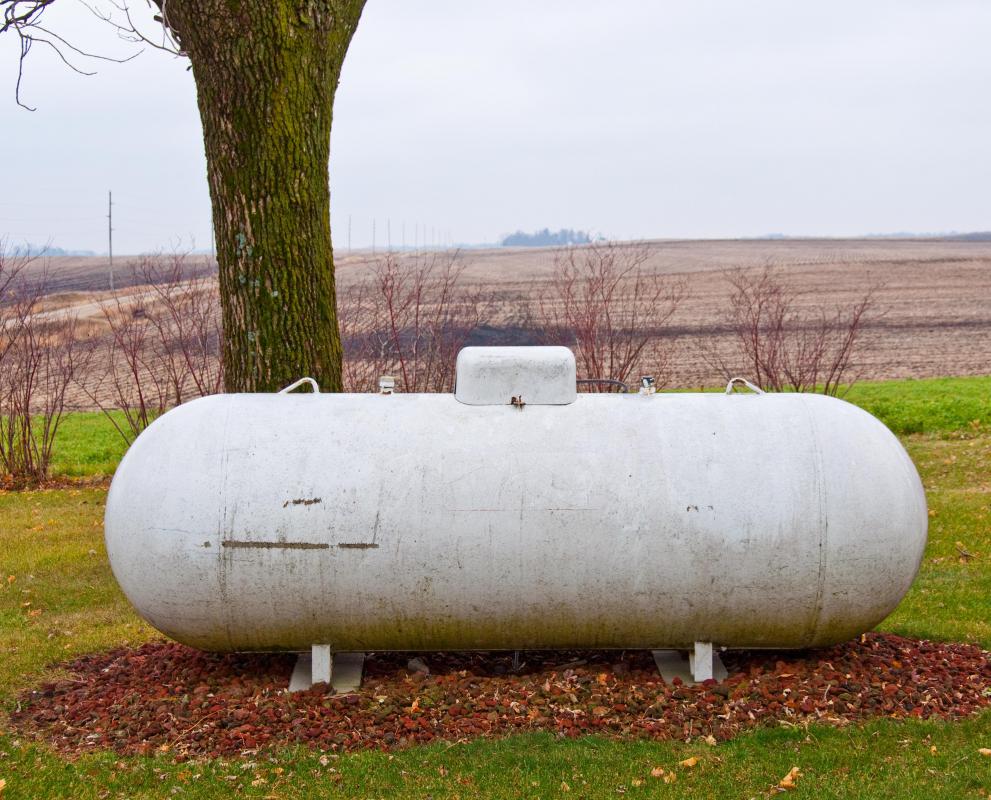At HomeQuestionsAnswered, we're committed to delivering accurate, trustworthy information. Our expert-authored content is rigorously fact-checked and sourced from credible authorities. Discover how we uphold the highest standards in providing you with reliable knowledge.
What is Liquid Propane?
Propane is a petroleum-based product that is used in either liquid or vapor form. Propane can only be found in its liquid form when under extreme pressure or in temperatures below -45° Fahrenheit (-42.7° Celsius). When liquid propane reaches a temperature of -44° F (-42.2° C), it boils and turns into a vapor.
Since liquid propane is an extremely cold substance, it can also be dangerous is handled improperly. Frostbite from accidental misuse is quick and extreme. In appearance, it is odorless, colorless, and tasteless and appears much like a glass of water.

Systems use either liquid or vapor propane and the two forms are not interchangeable. Heating systems like home heaters or cooking devices burn the vapor form of propane. Storage tanks keep the fuel under pressure and therefore in liquid propane form. As the propane leaves the tank and enters a non-pressurized area under normal temperatures, it is converted to vapor. Storage tanks must always be kept upright to keep the liquid regulated as it leaves the tank, as burning it could cause dangerous fires.

One of the most interesting uses of liquid propane is within the automotive industry. Liquefied Petroleum Gas (LPG) first appeared as a vehicle fuel around 1913 and has since been used primarily in the trucking industry. As of 2009, there are no passenger vehicles produced in the United States that run on LPG, although consumers interested in running their car on this fuel can obtain converter kits for their gas or diesel fueled cars.
There are several attributes of LPG that make it appealing. It is mostly produced in the United States, which cuts down on foreign reliance for fuel. It burns cleaner than gasoline and emits less toxic substances and pollutants into the air. The cost per gallon is generally less as well.
For all of its positives, there are a few negatives to liquid propane as vehicle fuel. There have been many reports of consumers being hurt from splashes of it since it can cause frostbite in an instant. Neither the cars that run on propane nor the liquid propane to run them on is not as readily available, so those who wish to use it must hunt down suppliers and take the time to put a converter kit on their car. The fact that it is petroleum-based means that it is not a renewable source, so environmentalists argue that it is another source that will eventually run out and one that is still not completely clean.
AS FEATURED ON:
AS FEATURED ON:












Discussion Comments
Well, for one thing, natural gas is only available in the cities. Out in the country, even in small towns, LP gas is all we have, unless you want an all electric home. It's pretty rare to have a leak. Practically everything I have in my home runs off LP gas, including the clothes dryer.
A friend once told me that while him and his party were in Alaska, they used open five-gallon buckets of propane as a camp fire. They apparently lit the bucket of propane, in liquid form, and it would burn for hours. Is there any facts that would contest this story?
I don't know, but electricity is getting more expensive here in oregon. I'm thinking about switching over to propane for that reason.
@jholcomb - I don't know about other parts of the country, but I lived briefly in Southwest Georgia and it was pretty common there. Natural gas is definitely better for home use in many ways--it burns hotter, for one--but not everyone has access to natural gas. And a lot of people like gas for cooking and running a fireplace.
The house I lived in down there had a 500 gallon liquid propane tank buried in the front yard. (LP tanks can be safely buried, unlike oil tanks.) That's unusually big; the original owners of the house had wanted to run the water heater and the heat from LP as well as the fireplace and cooktop. People that just wanted to run a fireplace and maybe a cooktop sometimes had small tanks in their garage.
My favorite thing about having the tank was that we had the gas grilled hooked into it, so we never had to worry about the cylinder going empty. (I guess our tank could have run empty, but the local utility the the gas came from checked it quite often.) I also liked that it was a local company; I taught the owner's daughter in my class.
The worst part was we had a leak. Fortunately, it was outside, so it wasn't a danger to us. Unfortunately, that meant we didn't smell it until it had leaked hundreds of dollars of gas!
I've heard of people having oil tanks, but I've never heard of people having propane at their homes. I've only seen the liquid propane cylinders like you buy at the grocery store to run your gas grill with. Is it more common in certain parts of the country?
Why would someone choose propane over natural gas or just electricity?
Post your comments